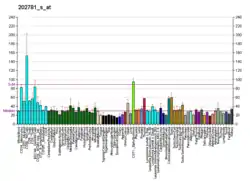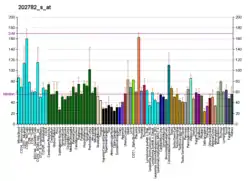SKIP
SKIP is an acronym for Skeletal muscle and kidney enriched inositol phosphatase, which is a human gene.[5]
Function
This gene encodes a protein with 5-phosphatase activity toward polyphosphate inositol. The protein localizes to the cytosol in regions lacking actin stress fibers. It is thought that this protein may negatively regulate the actin cytoskeleton. Alternative splicing of this gene results in two transcript variants encoding different isoforms.[5] Overexpression of SKIP in mice affects osmoregulation in kidney collecting ducts.[6]
References
- GRCh38: Ensembl release 89: ENSG00000132376 - Ensembl, May 2017
- GRCm38: Ensembl release 89: ENSMUSG00000006127 - Ensembl, May 2017
- "Human PubMed Reference:". National Center for Biotechnology Information, U.S. National Library of Medicine.
- "Mouse PubMed Reference:". National Center for Biotechnology Information, U.S. National Library of Medicine.
- "Entrez Gene: SKIP skeletal muscle and kidney enriched inositol phosphatase".
- Pernot E, Terryn S, Cheong SC, Markadieu N, Janas S, Blockmans M, Jacoby M, Pouillon V, Gayral S, Rossier BC, Beauwens R, Erneux C, Devuyst O, Schurmans S (Dec 2011). "The inositol Inpp5k 5-phosphatase affects osmoregulation through the vasopressin-aquaporin 2 pathway in the collecting system" (PDF). Pflügers Archiv. 462 (6): 871–83. doi:10.1007/s00424-011-1028-0. PMID 21938401. S2CID 27923688.
Further reading
- Drayer AL, Pesesse X, De Smedt F, Communi D, Moreau C, Erneux C (Nov 1996). "The family of inositol and phosphatidylinositol polyphosphate 5-phosphatases". Biochemical Society Transactions. 24 (4): 1001–5. doi:10.1042/bst0241001. PMID 8968500.
- Mitchell CA, Brown S, Campbell JK, Munday AD, Speed CJ (Nov 1996). "Regulation of second messengers by the inositol polyphosphate 5-phosphatases". Biochemical Society Transactions. 24 (4): 994–1000. doi:10.1042/bst0240994. PMID 8968499.
- Ewing RM, Chu P, Elisma F, Li H, Taylor P, Climie S, McBroom-Cerajewski L, Robinson MD, O'Connor L, Li M, Taylor R, Dharsee M, Ho Y, Heilbut A, Moore L, Zhang S, Ornatsky O, Bukhman YV, Ethier M, Sheng Y, Vasilescu J, Abu-Farha M, Lambert JP, Duewel HS, Stewart II, Kuehl B, Hogue K, Colwill K, Gladwish K, Muskat B, Kinach R, Adams SL, Moran MF, Morin GB, Topaloglou T, Figeys D (2007). "Large-scale mapping of human protein-protein interactions by mass spectrometry". Molecular Systems Biology. 3 (1): 89. doi:10.1038/msb4100134. PMC 1847948. PMID 17353931.
- Rual JF, Venkatesan K, Hao T, Hirozane-Kishikawa T, Dricot A, Li N, Berriz GF, Gibbons FD, Dreze M, Ayivi-Guedehoussou N, Klitgord N, Simon C, Boxem M, Milstein S, Rosenberg J, Goldberg DS, Zhang LV, Wong SL, Franklin G, Li S, Albala JS, Lim J, Fraughton C, Llamosas E, Cevik S, Bex C, Lamesch P, Sikorski RS, Vandenhaute J, Zoghbi HY, Smolyar A, Bosak S, Sequerra R, Doucette-Stamm L, Cusick ME, Hill DE, Roth FP, Vidal M (Oct 2005). "Towards a proteome-scale map of the human protein-protein interaction network". Nature. 437 (7062): 1173–8. doi:10.1038/nature04209. PMID 16189514. S2CID 4427026.
- Chen J, Xu J, Zhao W, Hu G, Cheng H, Kang Y, Xie Y, Lu Y (Nov 2005). "Characterization of human LNX, a novel ligand of Numb protein X that is downregulated in human gliomas". The International Journal of Biochemistry & Cell Biology. 37 (11): 2273–83. doi:10.1016/j.biocel.2005.02.028. PMID 16002321.
- Cardoso C, Leventer RJ, Ward HL, Toyo-Oka K, Chung J, Gross A, Martin CL, Allanson J, Pilz DT, Olney AH, Mutchinick OM, Hirotsune S, Wynshaw-Boris A, Dobyns WB, Ledbetter DH (Apr 2003). "Refinement of a 400-kb critical region allows genotypic differentiation between isolated lissencephaly, Miller-Dieker syndrome, and other phenotypes secondary to deletions of 17p13.3". American Journal of Human Genetics. 72 (4): 918–30. doi:10.1086/374320. PMC 1180354. PMID 12621583.
- Ijuin T, Takenawa T (Feb 2003). "SKIP negatively regulates insulin-induced GLUT4 translocation and membrane ruffle formation". Molecular and Cellular Biology. 23 (4): 1209–20. doi:10.1128/MCB.23.4.1209-1220.2003. PMC 141139. PMID 12556481.
- Gurung R, Tan A, Ooms LM, McGrath MJ, Huysmans RD, Munday AD, Prescott M, Whisstock JC, Mitchell CA (Mar 2003). "Identification of a novel domain in two mammalian inositol-polyphosphate 5-phosphatases that mediates membrane ruffle localization. The inositol 5-phosphatase skip localizes to the endoplasmic reticulum and translocates to membrane ruffles following epidermal growth factor stimulation". The Journal of Biological Chemistry. 278 (13): 11376–85. doi:10.1074/jbc.M209991200. PMID 12536145.
- Ijuin T, Mochizuki Y, Fukami K, Funaki M, Asano T, Takenawa T (Apr 2000). "Identification and characterization of a novel inositol polyphosphate 5-phosphatase". The Journal of Biological Chemistry. 275 (15): 10870–5. doi:10.1074/jbc.275.15.10870. PMID 10753883.
This article is issued from Wikipedia. The text is licensed under Creative Commons - Attribution - Sharealike. Additional terms may apply for the media files.





